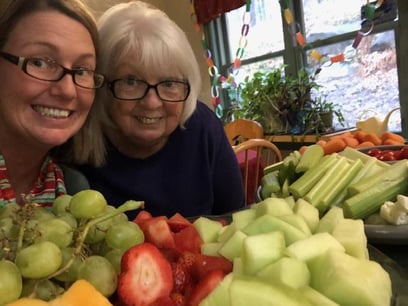When my mom first was diagnosed with pancreatic cancer just over a year ago, a very dear friend left me a note with flowers that said, “We will take care of you, so you can take care of her.” And while my parents retired to be close to us over a decade ago, it was the very first time I had to acknowledge my own parents’ mortality. The universe didn’t seem to understand that my mom was my person. My caregiver. The one taking care of me so I could take care of everyone else.

Growing up with a mom who cared meant always having someone sit on the edge of bed and be present even if I didn’t want to talk about whatever was bothering me. I do my best to channel my mother’s patience and empathy when my own 12-year-old daughter is venting her emotions about whatever life’s most recent challenge or obstacle has pissed her off. I do my best to channel my mom’s sense of humor and blind optimism (a term my brother coined in reference to her) in dealing with my son’s love for jumping off bridges and roofs and hucking himself into the air on his skis.
One of my favorite childhood memories was her letting my brother, who was maybe 10 at the time, build a raft and then drop him at an actual river. They arranged to meet downriver a couple hours later, and I was with her when we got to the spot where he was nowhere to be found. I panicked at 12 years old that he had drowned or gotten stuck somewhere or the current was faster than expected and he was already in another state by now, but our mother remained very calm simply stating that he must have gotten out of the river earlier and we would just drive up to the next spot. He was fine sitting on a rock waiting for us; the reality was that his raft wasn’t as river worthy as he thought, and this natural consequence was good for him to learn.
As an adult, she knew there were times when Geoff’s spinal cord injury made certain things harder, and I didn't burden Geoff with those things as they were mostly beyond his control. When mother nature dumped snow, I was the one out there with the snowblower. When cords of wood were delivered every spring, the children and I stacked, and Geoff “supervised.” When a baby or toddler cried out in the middle of the night, I was the one who got up every single time. I made the dinner and the school lunches and did the laundry and the grocery shopping. Mom listened. And I always felt better after venting to my mom. Sometimes we just have to throw our frustrations out into the universe and then we pick ourselves back up. But even the best caregivers need their support people. When I was sick, my mom made me chicken soup and did our laundry and read my kids stories at bedtime. She always bought me clothes for my birthday and Christmas knowing that I no longer shopped for myself as money was always tight. But mostly, she listened and reminded me to laugh.

